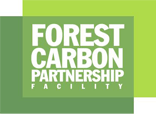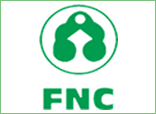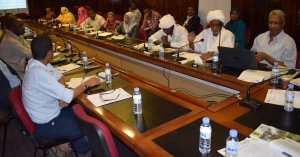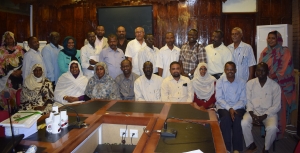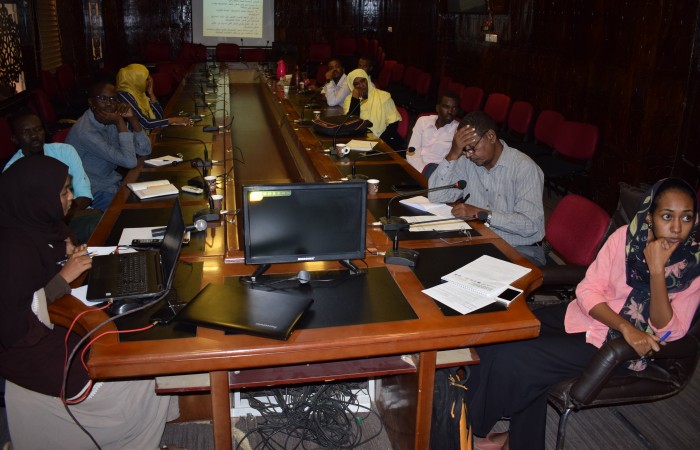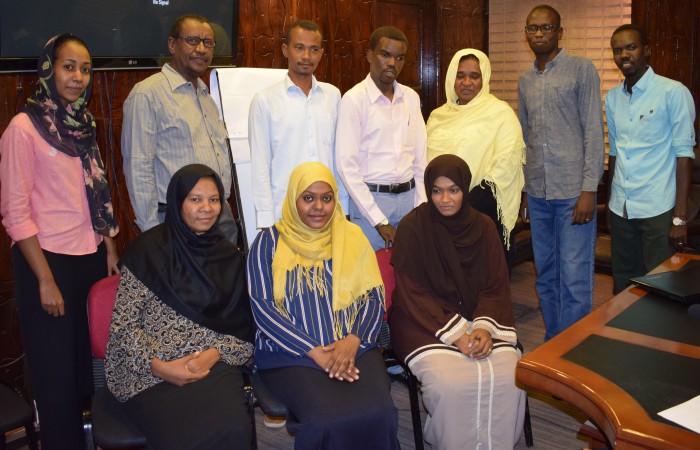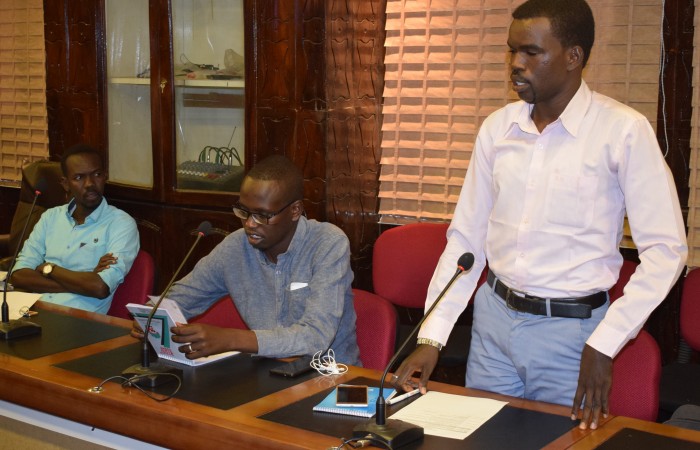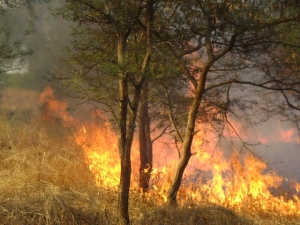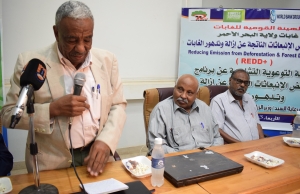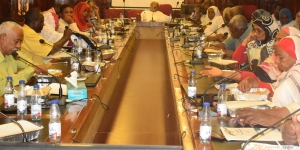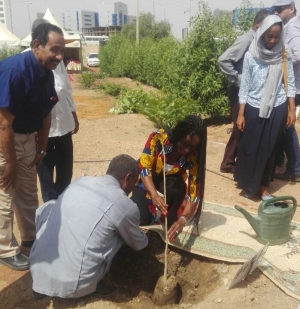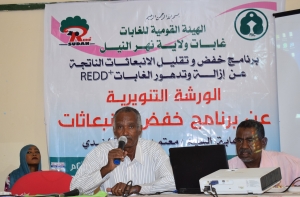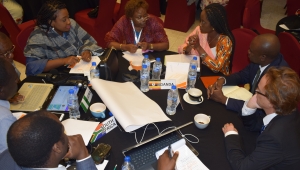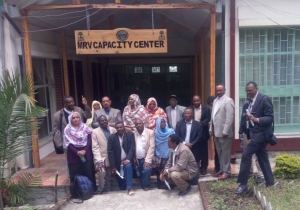Super User
Steering Committee , Meeting NO, 4
In line with REDD+ program organizational set up and Governance requirement the periodic steering committee meeting NO (4) was held on January 17th 2019.
The meeting was headed by The State Minister of Agriculture and Forestry, co-headed by the DG of Forest National Corporation and attended by 23 participants representing different stakeholders.
The meeting included the following:-
- Brief Note by his Excellency Minister of Agriculture.
- Brief Note by the DG of FNC.
- Presentation on REDD+ program and the key hot issues by National REDD+ program Coordinator.
- Discussion on the last Meeting Notes and the progress made so far.
The R-Package study, self-assessment process
The Readiness Assessment Package (R-Package) is a major milestone and comes at the transition stage from REDD+ readiness preparation to piloting performance-based activities. The R-Package is an important requirement by the FCPF for assessing progress, strengths and weaknesses, and seeking objective feedback from relevant national and sub-national stakeholders involved in Sudan’s REDD+ process. Sudan is preparing its R-Package at an advanced stage of its readiness preparation to benefit from the outcomes and feedback of the self-assessment to improve and consolidate its readiness preparation. The implementation of Sudan’s readiness program is scheduled to be completed by December 2019, in line to the additional grant agreement.
The objectives of R-Package study
- To synthesize and consolidate the findings of analytical studies carried out during the readiness preparation process
- To assess progress made by Sudan on REDD+ Readiness through multi-stakeholder consultation workshops at district, national and regional levels;
- To prepare an R-Package report on the basis of criteria and diagnostic questions in the R-Package Assessment Framework
- Results of assessment of progress made the readiness preparation;
- Results of the national multi-stakeholder self-assessment;
- Insights on significant achievements made and lessons learned in all sub-components;
- Identification of remaining gaps and areas that require further development in all sub-components;
- Next steps and planned activities for transitioning to the implementation phase
The self-assessment process
The self-assessment process was conducted during the period 23 December 2018 to 7 January 2019. In total, 74 representatives of nine stakeholder groups have participated in self-assessment process, of which 43 percent are women. Participants include PMU staff, state focal points, members of the Technical Advisory Committee, the Steering Committee, and the Technical Working Groups, as well as representatives from 10 civil society organizations and two development partners .
Table below presents the stakeholders groups that participated in Sudan’s REDD+ readiness self-assessment and the sub-components that each group considered
Stakeholder groups that participated in the readiness self-assessment
|
Stakeholder group |
No. of representatives |
Gender |
Readiness sub-components |
|
|
|
|
Women |
Men |
|
|
Programme Management Unit |
8 |
4 |
4 |
All sub-components |
|
States Focal Points |
21 |
5 |
16 |
All sub-components |
|
Technical Multi-Sector Advisory Committee |
3 |
1 |
2 |
Sub-component 2 |
|
National REDD+ Steering Committee |
9 |
4 |
5 |
Sub-component 2 |
|
Technical Working Groups |
20 |
11 |
9 |
Sub-components 2, 3 and 4 |
|
Civil Society organizations forums |
11 |
6 |
5 |
Sub-component 1.B |
|
Development Partners |
2 |
1 |
1 |
Sub-components 1.A, 3 and 4 |
|
Total |
74 |
32 |
42 |
|
Five sessions have been organized for the different stakeholder groups to perform their self-assessment of Sudan’s REDD+ readiness program. The self-assessments by the development partner were solicited through a dedicated form which was sent to relevant representatives of the World Bank and FAO, respectively. The objective of the self-assessment sessions was to provide a platform for consideration and discussions among the stakeholder on the progress made to date across all the sub-components of the readiness proposal against the FCPF RAF assessment criteria. The organization of the sessions included the following:
- A presentation on the progress made to date on the implementation of the readiness activities as described in the FCPF two grant agreements to ensure that all stakeholder groups are fully aware of all readiness activities, including in other components outside their mandate.
- A presentation on the self-assessment process which explained the context, the rationale, the objectives, advantages, methodologies and expected results.
- A dedicated form was provided to the participating stakeholders to write down the results of the self-assessment. The form is based on the criteria and diagnostic questions in the RAF, and provides space for scoring against the assessment criteria using color coded score ranges for each of the progress indicators (traffic lights). These codes range from 0-100, where each of the range represents a specific color. A score ranging 100-81 is represented in green, 80-51 is represented in yellow, 50-21 is represented in orange, and 20-0 is depicted in red. The score ranges are qualitative and enable aggregation of results across the stakeholder groups. The form also provides space for noting significant achievements and lessons learned, as well as gaps and issues the require further Development.
- Stakeholders were divided into breakout groups (e.g. state focal points) or worked as one group, according to the size of the groups or their mandate in the readiness implementation. Each group was asked to assign a chair to steer the discussions and a rapporteur to report the results of the self-assessment of its group.
- Diagnostic questions have been translated and explained by the consultant during the self-assessment session. Additional clarifications were provided during the self-assessment session upon requests from the stakeholders. Clarifications were mostly sought due to the fact the some questions suggesting readiness systems, such as the benefit-sharing mechanism, the ESMF and the FGRM are fully operational and are already being tested in the REDD+ implementation phase which is not true in the case of Sudan.. Therefore, the stakeholders were asked to also take into consideration the readiness activities that are planned to be completed by the end of the additional grant agreement (December 2019). For this reason, a presentation on the progress made in the implementation of the two grant agreements was necessary to inform the stakeholders on all the readiness activities that will be implemented in Sudan’s readiness program until December 2019.
- The guidance provided by the consultant and followed by the stakeholders in their self-assessment was to start by discussing the progress based on the diagnostic questions provided for each criterion – normally 1-3 questions per criteria – and to build a common understanding on whether the progress made meets these criteria. Then, the group collectively agreed on a single score using the scoring ranges and provided its feedback on significant achievements made, lesson learned, gaps and issues that require further development within or beyond the remaining time of Sudan’s readiness program implementation (December 2019) in bullet format.
- The outcomes of the self-assessment by the different stakeholder groups have been collected, combined and analyzed.
Internship Program
PMU of REDD+ program organized a meeting with the researchers under internship Program at 28 November 2018 in gum Arabic hall, Forests National Corporation. It was attended by researchers (6) and PMU of REDD+
The purpose of the meeting
- Introduce presentations on the Progress made in the researches.
- Exchange ideas amongst the researchers to maintain complementarity.
- Help researchers to overcome any difficulties they are facing.
The contents of the meeting
The meeting included six presentations
- Quantifying the changes of land use/cover on Forest Cover in Cerro Forest, Sennar State.
- The impact of tree belts on agricultural productivity in the state of Gedaref and the amount of biomass. the deterioration of Mangrove forests and their social and environmental impacts in the Red Sea state.
- Assessment of socio-economic characteristics of the local community and biophysical status of Kodroka and Kasinger forests in Northern State, Sudan.
- Assessment of Forests resource Degradation in Central Darfur state , study case Um Aroog Natural forest.
- Quantification of Drivers.
The outputs of the meeting
- The researchers received the comments from the audiences.
- There was a very clear Complementarity amongst the researches and very rich information.
- The researches cover diverse issues and different area in Sudan.
- Researchers have been oriented about the regional workshops which planned to start by the eastern region (Mangrove forests).
Workshop on Wildfire Management and Monitoring in Sudan October, 30, 2018
The workshop were aimed to identify the status of existing knowledge related to wildfire of the Sudan; discuss the different programmes of wildfires management, and appropriate network relationships to support such programmes .
42 participants attended the workshop representing various Government entities (including REDD+ Focal Points of States in the hotspot areas), NGOs, academia, research institutes and journalists
Opening remarks were made by 3 speakers are
Dr. Syada. Khalil, Coordinator of the Sudan REDD+ program
Mr. Matthias Lichtenberger, Chief Technical Advisor
Mr. Osman Omar, representative of the Director-General, Forests National Corporation (FNC)
4 papers were presented at this workshop that covered topics such as Wildfire monitoring in Sudan , Remote Sensing , Fire Management, Forests and Fire
These papers were presented by
Mr. Peter Moore, Forest Officer
Dr. Mohammed Al-Jamri Atta Al-Mannan Assistant Professor, Faculty of Forestry and Range Science- Sudan University
Dr. Muhanad behalf of Dr. Solafa Babiker, Director, Remote Sensing and Seismology Authority
Rasha Abdalla Fadul Abdalla, Focal Point for Forest Fires; FNC
Summary of discussions
The number of participants in the discussion reached 17, addressing a number of hot issues related to forest fires.
The outcome of the workshop was 13 recommendations as follows
Lack of sharing of data between different institutions
Lack of collaboration and meager capacity in firefighting
Networking and linkages
Revisit the forest extension system to accommodate the new trends in forest protection
Revisit the protection system of FNC
Conducting of workshops in the states for better sharing and involvement of stakeholders
Collaboration with neighboring countries for knowledge and experience
Up-scaling of success stories like Jabal Marra experience with GTZ project
Revisit the native administration as local management mechanism
Human and financial resources support for the new born fire control unit of FNC.
Involvement of academia and research in developing effective models for firefighting and to have good networking with private sector
Awareness raising for different stakeholders
Awareness campaign For REDD+ programmer ,Red sea state, 3 October 2018
The workshop was took place on 3 October 2018, elkhaber hall for international conference, Red sea
The workshop was attended by 72.
19Female.
53 male.
The participant involve wide spectrum of representation Including:- Ministry of agriculture livestock, and fishers , Ministry of agriculture / local of sinkat , Ministry of environment and natural resources ,Council of environment and natural resource, Director of Horticulture Department , Administration of Wildlife Management , Director of agriculture extension Department , Director of soil conservation, Director Manager of livestock , Director Manager of agriculture land, Forests National Corporation, General Directorate of Plant Protection , Representatives of local sinkat , Local Reprehensive of Sinkat, Tokar, Haya, Gneeb oleeb, Kalaneebeb , Halaibs, Hallok, Gebet elmaden and dreeb .
Objective of the workshop:-
To aware the community and stakeholder about REDD+ activities, objectives and the role of forests in climate change.
Workshop started by Quran and then opining remarks from:- Mr. Musa Abdalla Eisa – General of red sea forests state, Prof Ahmed abdelaziz, manager of university of Red Sea , Mr. Isam eldeen sorkti – General Manager of ministry of agriculture livestock.
The outcome of the workshop was 20 recommendations as follows
- The importantance of this kind of awareness companies and the survey visit
- Restore the concept of forests and deserts.
- Restore the culture of popular forests.
- The contribute of transport to enhance GHGs emission, need awareness.
- Activation the law and regulation to protect the forests.
- Valuation effort of Forests National Corporation to protect the forests.
- The role of stakeholder to success the REDD+ pogramme.
- Biodiversity of vegetation cover of the state, introducing the mesquite tree (Boscia Senegalensis) to combating desertification.
- The important of Mangrove forests especially in the coast area.
- Benefit of mangrove forests for the ground water.
- Management and admistrarion illegal cutting.
- Illegal cutting, the main cause of deterioration of environment.
- Studies related to climate change should be covered all states.
- Training to pasture by local language.
- Management of track of pasture (Massmart).
- Natural conservation solution for illegal cutting and over grazing.
- Consumption of charcoal and gases.
- Transference experience from another states to Red sea state.
- The important of include participantation of local community.
- Forests and wildlife is the tow faces for coins.
Validation Workshop for Developing Feedback and Grievance Redress Mechanism study (FGRM) for Sudan’s REDD+ Programm
27 September 2018
This workshop was intended as a validation workshop for the study of "Developing Feedback and Grievance Redress Mechanism, (FGRM) for Sudan’s REDD+ Programme" undertaken under the REDD+ Sudan. The specific objectives of the workshop were as follows:
- Sharing the study and its results with the project stakeholders;
- Validation of the study
3 .Providing a platform for the discussion of developing Feedback and Grievance Redress Mechanism for Sudan’s REDD+ programme issues.
- Soliciting and generating recommendations that are likely to help the REDD + and other actors in natural resources management including Government of Sudan and its international partners and civil society organizations SCOs
Participants: The Workshop was attended by 45 persons out of whom 64.4% were males and 35.6% were females. The participants involved a wide spectrum of representation including staff of Forests National Corporation (FNC); Research Institutions; Educational Institutions; Higher Council for Environment and Natural Resources; Private sector; Related Ministries (Ministries of Agriculture and Forests, Minerals, Oil and Gas, Animal Resources; Department of Wildlife); Sudanese Agricultural Council; CSOs; and interested researchers and environmental activists
World Bank Mission September, 2018
Mission from World Bank came to Sudan for REDD+ program .during September 16- October 1 , 2018,.
Aimed for reviewing the implementation of the Phase one and progress on implementation of the second phase
The mission Schedule included Visiting the REDD+ programm in FNC & Meeting with FNC Director General another meeting with the new Minister of Agriculture and Forests ,Visiting Federal Ministry of Finance. The presentations contained a number of issues such as review of phase 1 activities -deliver on phase 2 , review of FM and procurement , communications and media output, summary of overall SESA and ESMF, final report FGRM, feedback from Ethiopia study . The mission supervised the regional workshop , which included participants from seven FCPF countries.
The members of mission
Tracy Hart PhD, Senior Environmental Specialist, Environment & Natural Resources, Current TTL for both REDD+ and SSNRMP
Dora Nsuwa Cudjoe , Senior Environmental Specialist, Co-TTL for both REDD+ and SSNRMP
Awareness campaign on REDD+ at The Nile River
Date of the workshop: 12/ 9/ 2018
Venue: National Training Center, River Nile State
Number of participants : 66 participant were formed from NGOs organization, government departments and The leaders of the People's Work
Workshop Program
The manager of Forests at River Nile State introduced Enlightenment about REDD+ program
Executive Director, Representative of Shendi locality introduced brief on River Nile State
Ms. Amani Ibrahim - Forest extension , FNC headquarters presented a paper on the REDD+ objectives , REDD+ stages ,REDD+ partners and the next steps .
The workshop concluded by 12 recommendations
- Establish agricultural schemes for cultivation trees of economic value
- Preserving wildlife , environment and biodiversity by rehabilitation of forests
- Encourage use of alternative energies such as solar energy, electrical and improved stoves
- Improve the school environment, nurseries and adopt trees planting
- encouraging investment in forests by projects for the pepole around forests
- enhancing the extension programs with the local communities , students , NGOs, civil societies organization
- Attention to the removal mesquite in the irrigated areas of agricultural schemes
- Provision of trees seeds for citizens
- Activating the natural fences law at agricultural schemes
- establishing a database
- Intensification of agricultural and animal production
- coordination between REDD+ and Community Development College
Regional Exchange Workshop on Designing and implementing the REDD+ Strategy and Emissions Reduction Program
16 – 18 September 2018
REDD+ Sudan Regional workshop was organized during the period 16 – 18 September 2018, in Khartoum, at The Grand Holiday Villa Hotel. A total of 100 participants have attended the workshop. They represented different REDD+ countries (Kenya, Ethiopia, Ghana, Nigeria, Côte d'Ivoire, Uganda, and South Africa in addition to Sudan participants. The 18 REDD+ focal points at states, line ministries, Gum Arabic producer association, Civil Society Organization and Indigenous People organization, analytical studies consultants, and private sector have also participated in this regional workshop
Rationale for the Regional Workshop: As REDD+ is a relatively new concept for the different REDD+ countries, the opportunity to learn from each other will provide valuable knowledge for designing and implementing emissions reduction programs at the national level. Although Sudan has already been exposed to experiences in Ethiopia and Ghana which have been reflected in acceleration of the momentum of the REDD+ readiness phase, the regional workshop will be an added value that could provide more insight and opportunities to Sudan. Added to that, the diversity of the ecological landscape for Sudan (desert, mountains forest, Riverine forest, and savannah) and the integrated approaches to natural resource management will offer the space for sharing Sudan’s unique lessons. This regional workshop would also enable Sudan to glean innovative approaches to managing its diverse landscape from FCPF participant countries.
Objectives of the Workshop: 1- To share the lessons learnt from other countries in the sub-region on designing and implementing REDD+ national strategies and emissions reduction programs and derive applicable lessons for Sudan.
2- To share experiences from Capacity Building of Indigenous People (IPs) in REDD+ readiness in Africa (MPDIO) & PAC JA) funded by the FCPF.
Expected outcomes
1-Enhanced capacity of participants to improve REDD+ national strategies and emissions reduction programs in their respective countries through interactive knowledge exchange
2-Exchange of lessons learnt in the design and implementation of REDD+ national strategies and emission reduction programs
3- Exchange of lessons learnt from IPs at the regional and national level
Exchange Visit of the Sudanese REDD+ Colleagues in Ethiopia National REDD+ Secretariat, Ministry of Environment, Forest and Climate Change (MEFCC)
September 2- 8 /2018, Addis Ababa, Ethiopia
Within the frame work of the south –south exchange learning visits a delegation from the Govt of Sudan REDD Readiness program was conduct visit to Ethiopia during 2- 8 September 2018 to see and learn about what has been achieved in the area of three phases REDD+ program.
16 Participants represent the Different institutions; Ministry of Animal Resources, Ministry of Agriculture and Forest, Ministry of Finance, IFAD and FNC, REDD+ TAC members, Wildlife Administration and Technical NFI officer (White Nile &North Kordofan) were participate in this exchange visit
The main objectives were:
- To share experiences between Sudan and Ethiopia in mainstreaming REDD+ in the development policy agenda, land tenure, land use planning, benefit sharing and involvement of key stakeholders with a focus on the youth and gender in forest landscape management.
- To facilitate participant learning from the success and challenges during implementation of REDD+ in Ethiopia.
Lessons learnt: •Capacity building of Natural Resources institutions staffs at all level on (Data management, GIS, R.S, MRV,) lead to sound development of FREL/FRL
- Formation of Forest Association committee as a body to (the Ethiopian experience) play essential role in the FLR(piloting)
- Ethiopian experience in field Participatory Forest Management and Benefit Sharing Mechanism is a tool to conserve and protect natural forest.
- REDD+ Prog in Ethiopian embedded within the Climate Resilient Green Economy, CRGE Strategy with the vision: Achieve middle-income status by 2025 in a climate-resilient green Economy-Green Growth
- Through good Coordination between the different institutions and line ministries, this will have reflected positively on the adoptions and smooth implementation of projects
 English
English العربية
العربية 
